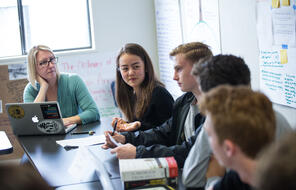Breadcrumb
Danielle Allen on Civic Agency
At a Glance
Language
English — USSubject
- Civics & Citizenship
- Democracy & Civic Engagement
Danielle Allen on Civic Agency

Danielle Allen is the James Bryant Conant University professor and director of the Edmond J. Safra Center for Ethics at Harvard University. At a Facing History and Ourselves forum at Harvard, Dr. Allen discussed several methods for civic participation.
There are multiple models for civic agency that bump around in our world. So we have different images in our head about what the civic actor is.
We have, for example, the idea of the League of Women Voters. People who provide other voters with information. And they set up forums for dispassionate deliberation and work with a model of the informed voter as the main way of participating in politics.
And then we have another model that came back to the fore for us with the Occupy movement 2010, 2011, the activist. There's no dispassion here. This is passionate, interested advocacy. We saw that, of course, in the Civil Rights Movement. We saw that in anti-war protesting in Vietnam.
But it's back again with social movements from Occupy to the movement for Black Lives and so forth. And there are lots of people who look at activism and think, that's not what civic agency is about. That's too messy. It's too confrontational and so forth.
And one of the reasons, I think, people think that is precisely because to go back, we have this other model about what it means to be a citizen also in our heads. And then what's the third model? The politician.
Now, the politician is a different-- altogether again-- way of being in politics. And we're confused about what the figure of the politician is. We have a very negative view of politicians.
So this is as of 2014-- and not even now but public approval of Congress since 1975 to the present. 1975, right after Watergate-- after Vietnam War, and here we are in 2014, it got down as low as 9% at a certain point.
So there's a fundamental problem with the figure of the politician in our contemporary world. And you hear that a lot from young people who say they don't want to be involved in politics. So politics is a dirty word. The figure of the politician has got something to do with why it's a dirty word.
The politician-- in the ideal form-- somehow combines dispassionate deliberation and the ability to compromise and combines partisan, loyalties, commitments to a party, solidarity and that sort of thing, and advocacy on that front, and really deep knowledge about political institutions and the tactics of using political institutions to make things happen.
But the point I want to make here is just that, these are really three different models of civic agency. And so for the educator, I think the first challenge is always, so which one are you teaching to? And I want to try to suggest-- actually today-- that you don't have to pick. That it's possible to teach to all three simultaneously.
But I do think this is one of the things that makes it hard. If you teach more to the activism model, people will say, why aren't you teaching the League of Women's Voter model of citizenship, for example?
So what I want to try to do is give you a framework that-- as I said-- unifies these three ways of being civic agents and provides a framework for teaching and thinking about them.
Now that Dr. Allen has defined three models for civic agency, she goes on to introduce the three-step process all civic agents follow, diagnose, prescribe, and justify.
So the first important point is that, the actual work being done is shared across these three models of civic agency. And it's pretty basic. The Declaration of Independence starts with a phrase, "when in the course of human events, it becomes necessary to declare the bonds connecting one country to another dissolved."
And so "when in the course of human events," that's a statement of diagnosis. I have surveyed my circumstances. I have diagnosed them as requiring the following prescription.
And then the Declaration goes on, when these things happen, it's necessary a-- respect for the opinions of mankind-- a decent respect for the opinions of mankind requires that we declare the reasons that impels the separation.
So the justification of a prescription is the third key piece of work of any civic agent regardless of the type-- diagnosis, prescription, justification-- and of course, then, bringing about action on the basis of those things. We'll come back round 2.
Now, the diagnosis part, we often, I think, imagine that that is the province of the rarefied world of policy experts. They're going to tell us how to fix the economy. Or they're going to tell us what we should be doing in health care.
But the truth of the matter is that the actual diagnosis of what's wrong in the world around us starts with us. And it starts with young people.
And if there is any message I could drive home the most forcefully today, it would be, namely, this, that really, young people, they see the shape of our world presently. I think they have a better understanding of it than any other generation.
But we are not letting young people set the agenda for the issues we pay attention to. And so I think, hearing young people's diagnoses, activating them as diagnoses, is the first and most important thing to do.
And then, yes, policy experts can come in and help think about the specific diagnoses that have been put on the table and listen to ideas about solutions and work with young people, work with other people about those solutions and bring their expertise to bear.
But that diagnosis is most powerful when it is a truly Democratic process, really bubbling up, and when the voices of youth are heard. And you can-- in some sense, it's easy to point to things.
The issue of mass incarceration, for example, young people get the power of that issue in a way that older generations don't for the very obvious reason that it more directly affects them.
And you can go through a list of things like that the economy-- the uncertainty of jobs and work right now in the economy, young people get that more powerfully than people my age and above do. And we have to get that voice into the agenda-setting conversation.
While all civic agents follow that three-step process, their methods for engaging others may differ. In the following clip, Dr. Allen describes three types of examples for engagement, deliberation, prophecy, and fighting fair.
So then, what distinguishes these three different types of civic agency? The distinction comes in in the methods. And there are a few different elements to the differences in the methods. I just want to point out a few.
So sometimes, when people talk about civic discourse and civil discourse, they want to stress the concept of deliberation. We should all get together and leave our passions or our interests at the door and have a calm, reasonable deliberation about what to do.
And that's right for one aspect of civic agency. That's a part of it. Deliberation is one task. That's the task of the League of Women Voters and other organizations like them have embraced. That's right.
But there's another task too, think about Martin Luther King, Jr. standing up in the March on Washington and saying, "I have a dream." In that moment, he conveys a new vision of American values and invites the entire country to reconsider its priorities.
And that is prophetic. To do the work of getting people to shift their core understanding of which values matter most to them and their main priorities, that's not about being dispassionate. He wasn't dispassionate up there as he gave that speech. He was being a prophet.
That prophetic work, I think, is also, actually, what the Occupy movement was trying to do. They were trying to convince people that the gap between the 1%-- who have gained so much income and wealth over the last three decades-- and the 99% was a problem of moral urgency.
There was a lot of criticism of Occupy movement for not connecting their energy and efforts to policy. But that misses the point. They weren't interested in policy. They were interested in prophecy. They wanted us to internalize the 1% and 99% contrast and think about the moral urgency that flows from that.
And they succeeded at that. So prophecy is a second task. A third task is fighting fair. It's the partisan. Yes, people should be interested. They should have things that they're passionate about in politics.
The question is, how do we fight fair? We know how to talk about that in the context of sports. We have a concept of sportsmanship. We used to have concepts like that in politics. We've lost them.
So that's a problem that we've lost them. But it doesn't mean that there's not a space to think about fighting, adversarial interaction, as a part of the work of politics. It's part of it.
A tiny piece on that, I'll say, for example, it involves forgoing ad hominem attacks. Ad hominem attacks which are just personal to the individual are not fair. So it's a big lift to think about getting from the kind of fighting we have now back to fighting fair. But let me just put it out there as a project.
So there are just some ideas from Dr. Allen about making democracy work. To hear more of Dr. Allen's talk and to see a reflection and action framework for civic engagement, visit our website at www.facinghistory.org/democracy-and-us. And follow us on social media at #democracyandus.
Danielle Allen on Civic Agency
Political philosopher Danielle Allen discusses the ways of participating in democracy and the role of youth voices in the three-step process all civic agents follow.
You might also be interested in…
10 Questions for the Future: Student Action Project
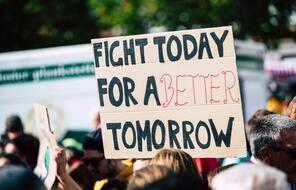
10 Questions for the Present: Parkland Student Activism
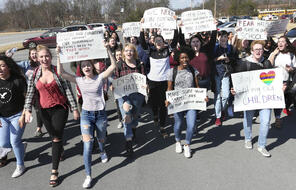
Standing Up to Hatred and Intolerance

#IfTheyGunnedMeDown
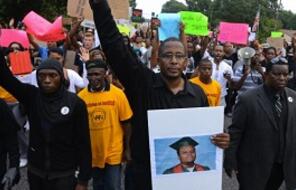
The Impact of Identity
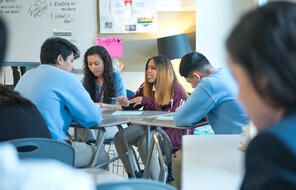
The Power of Images
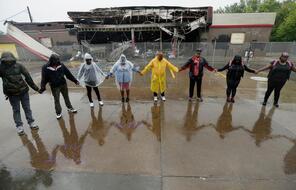
Preparing Students for Difficult Conversations
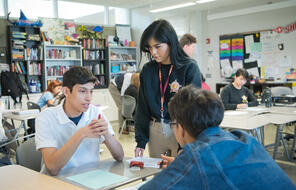
Social Media and Ferguson
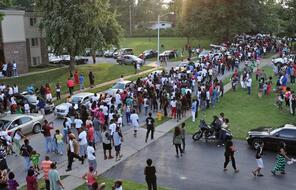
Verifying Breaking News

Facing Ferguson: News Literacy in a Digital Age

What Aspects of Our Identities Do We Show to Others?

How Do Communities Define We & They?
